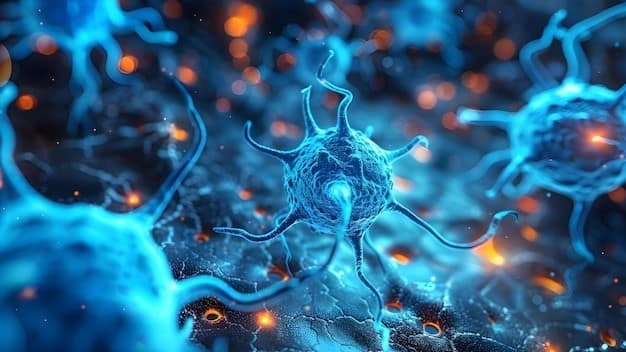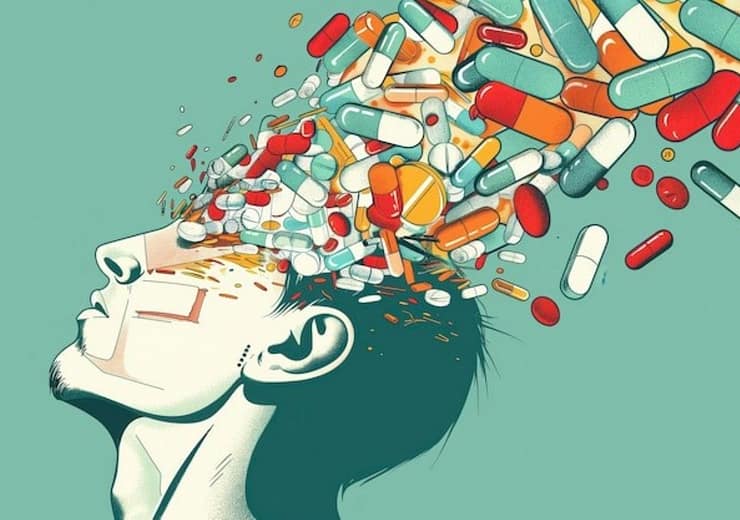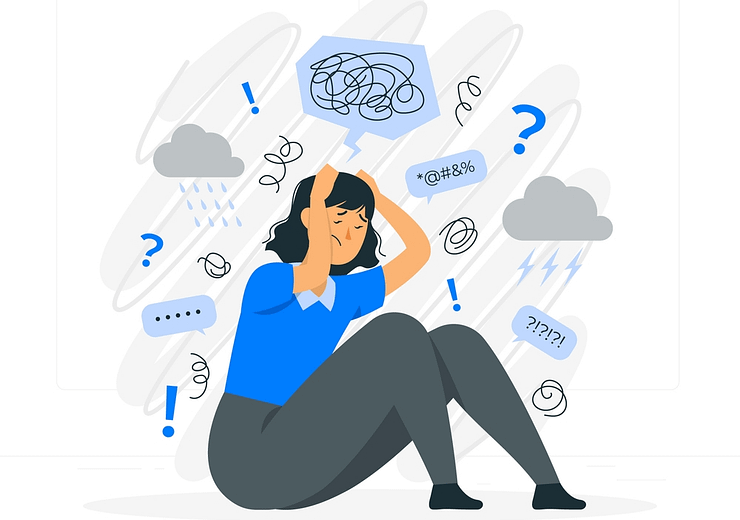The Role of Neurogenesis in Depression Recovery

Overview of Neurogenesis in Depression Recovery
A complex and crippling mental illness, depression affects millions of individuals globally. Researchers at the best depression center in Mumbai have worked to identify the fundamental causes of depression and create efficient therapies over the years. Neurogenesis, the process by which new neurons are produced in the brain, is one exciting field of study. This blog investigates the significance of depression recovery through neurogenesis, examining the science underlying it, the data from research by the TMS treatment clinic for depression in Mumbai on humans and animals, the effects of antidepressants, and lifestyle choices that can be enhancing neurogenesis for depression recovery.
The Science Behind Neurogenesis

To fully appreciate neurogenesis’s potential function in depression recovery through neurogenesis, one must grasp its fundamentals. This section will discuss the definition of neurogenesis, the main brain regions that are involved, and the variables that affect this process.
What is Neurogenesis?
The process by which neural stem cells and progenitor cells differentiate into new neurons is known as neurogenesis. The adult brain’s hippocampal area and the lateral ventricles’ subventricular zone (SVZ) are where this process predominantly takes place.
Particularly important for learning, memory, and emotional regulation is the hippocampus, which is why research of neurogenesis linked to neurogenesis benefits for mental health center on it.
Neurogenesis is a multi-phase process that includes neural stem cell multiplication, neuronal differentiation into distinct subtypes, neuronal migration to target sites, and integration into pre-existing neural networks. Environmental variables and a range of molecular signals control this complex process.
Key Brain Regions Involved in Neurogenesis

Hippocampus
Within the brain’s medial temporal lobe is a small, curving structure called the hippocampus. It is essential for the creation of new memories, navigating across space, and controlling emotions. One of the main locations of adult neurogenesis is the dentate gyrus, which is a component of the hippocampus. Changes in neurogenesis levels can have an impact on cognitive and emotional functioning, and this area is particularly sensitive to them.
Subventricular Zone (SVZ)
The lateral walls of the lateral ventricles contain the SVZ. In the adult brain, it is yet another important location for neurogenesis. Neuroblasts are produced by neural progenitor cells in the SVZ. These neuroblasts move to the olfactory bulb where they differentiate into interneurons that are important in processing smells.
Prefrontal Cortex
Despite not being a principal location of neurogenesis, the prefrontal cortex plays a role in mood and cognitive regulation. The overall effect of depression recovery through neurogenesis may be influenced by modifications in the functional connection between the prefrontal cortex and the hippocampal regions.
Factors Influencing Neurogenesis

The effectiveness and rate of neurogenesis can be influenced by a number of variables. Among them are:
- Genetics: The brain’s innate ability to respond to external stimuli and the baseline level of neurogenesis can both be influenced by genetic predispositions.
- Chronic stress: has been shown to inhibit neurogenesis, especially in the hippocampal region. Increased stress hormone cortisol can prevent neural progenitor cell multiplication.
- Exercise: Research done by TMS treatment clinic for depression in Mumbai has demonstrated that physical activity, particularly aerobic exercise, might be enhancing neurogenesis for depression recovery. Brain-derived neurotrophic factor (BDNF), which promotes the survival and development of new neurons, is elevated in response to exercise.
- Diet: Certain vitamins, antioxidants, and omega-3 fatty acids can all help in enhancing neurogenesis for depression recovery. On the other hand, a diet heavy in sweets and saturated fats might damage it.
- Sleep: Neurogenesis requires a sufficient amount of sleep. Lack of sleep can interfere with the integration of newly formed neurons and decrease the growth of neural stem cells.
- Environmental Enrichment: Enhancing neurogenesis for depression recovery by stimulating settings that offer sensory and cognitive demands. These kinds of settings promote memory and learning, which are directly related to the development of new neurons.
Neurogenesis and Depression Recovery

Neuroscience and psychiatry are highly interested in the connection between depression recovery through neurogenesis. Evidence from human and animal studies, clinical trials, and the function of antidepressants is examined in this section.
Evidence from Animal Studies

Understanding the connection between neurogenesis and depression has been made possible in large part by research on animals by the best depression specialist doctors in Mumbai. Reduced hippocampal neurogenesis has been linked to depressive-like behaviors in rodent models of depression, such as chronic stress paradigms. On the other hand, these behaviors can be mitigated by increasing neurogenesis through a variety of therapies by the doctors for tms depression treatment in Mumbai.
- Chronic Stress Models: In rats, prolonged stress causes a decrease in hippocampal neurogenesis, which results in depressive-like behaviors. Increased levels of inflammatory markers and stress hormones frequently follow this decline.
- Interventions: In rodents, depressive-like behaviors can be reversed by interventions like physical activity, environmental enrichment, and pharmaceutical treatments that increase neurogenesis. These results imply that stimulating neurogenesis might be a useful tactic for treating depression.
Human Studies and Clinical Trials

Although it is more difficult to collect direct data from human studies, there is indirect evidence that supports the function of neurogenesis in the recovery from depression. Technological developments in neuroimaging and post-mortem analysis have shed light on the potential impact of neurogenesis on human mood and cognitive abilities.
- Neuroimaging Studies: Functional MRI and PET scans have revealed that a decrease in hippocampal volume is frequently observed in depressed individuals, and this reduction is correlated with the intensity and length of depressive episodes. Hippocampal volume can rise if antidepressant or psychotherapy treatment is successful, indicating a connection between neurogenesis in depression treatment and healing.
- Post-Mortem Analysis: Research done by the doctors for TMS depression treatment in Mumbai on the brain tissue of decedents who suffered from depression has shown a decrease in neurogenesis markers in the hippocampal region. These results are consistent with the theory that part of the pathophysiology of depression is compromised neurogenesis.
- Clinical Trials: Clinical experiments have yielded encouraging results when examining the effectiveness of medications that stimulate neurogenesis, including some antidepressants and lifestyle modifications. For example, studies using selective serotonin reuptake inhibitors (SSRIs) have shown improvements in mood and cognitive function together with increases in the volume of the hippocampus.
Role of Antidepressants in Neurogenesis

It has been demonstrated that antidepressants, especially SSRIs, affect neurogenesis in depression treatment, which may be part of their therapeutic effects. This section examines the effects of various antidepressant classes on neurogenesis and how these effects may be used to treat depression.
- Selective Serotonin Reuptake Inhibitors (SSRIs): SSRIs are frequently given for depression. Examples of SSRIs are sertraline and fluoxetine. These drugs raise serotonin levels in the brain, which has been demonstrated to stimulate hippocampal neurogenesis. Research on animals has indicated that SSRIs’ capacity to increase neurogenesis mediates part of their antidepressant effects.
- Tricyclic Antidepressants (TCAs): While their mode of action is less focused than that of SSRIs, TCAs, like imipramine, can stimulate neurogenesis. Numerous neurotransmitters, such as norepinephrine and serotonin, are elevated by these drugs, and this can promote neurogenesis.
- Atypical Antidepressants: Atypical antidepressants have different modes of action, but they also stimulate neurogenesis. One example of this is bupropion. Numerous neurotransmitter systems, such as dopamine and norepinephrine, which might affect neurogenesis, are frequently targeted by these drugs.
- Mechanisms: Exact processes underlying antidepressant-induced neurogenesis yet to be determined. Nonetheless, it’s thought that they entail the control of inflammatory pathways and the overexpression of neurotrophic factors like BDNF.
Lifestyle Factors That Promote Neurogenesis

In addition to pharmaceutical interventions, neurogenesis can be strongly influenced by a variety of lifestyle factors. Developing a healthy lifestyle can increase neurogenesis and possibly help people recover from depression.
Exercise
Research has repeatedly demonstrated that regular physical activity, especially aerobic exercise, increases neurogenesis. Exercise raises BDNF and other growth factor levels, which help new neurons proliferate and survive. Exercises like cycling, swimming, and running are especially healthy.
Diet
Neurogenesis in brain health and depression recovery are supported by a well-balanced diet high in vital nutrients. Walnuts, flaxseeds, and fatty salmon are among the foods strong in omega-3 fatty acids that encourage the development of new neurons. Berries, dark chocolate, and green leafy vegetables are examples of foods high in antioxidants that promote neurogenesis and shield brain cells from harm.
Sleep
Neurogenesis depends on getting enough good sleep. The brain goes through mechanisms that rebuild and repair neural tissue as you sleep. Prolonged sleep deprivation might worsen depression symptoms and affect neurogenesis. Neurogenesis can be improved by establishing a regular sleep pattern and generating a relaxing sleep environment.
Mental Stimulation
Reading, solving puzzles, picking up new skills, and other mentally demanding pursuits can all stimulate neurogenesis. Cognitive tasks activate brain connections and promote the development of new neurons. To keep good brain health and depression recovery, mental activity and lifelong learning are crucial, Neurogenesis benefits for mental health in such cases.
Stress management
Long-term stress significantly reduces neurogenesis. Stress-reduction methods including yoga, mindfulness meditation, and deep breathing exercises can lessen the negative effects of stress on the brain. Stress-reduction techniques that are incorporated into daily life can enhance neurogenesis and enhance mental well-being.
Social Interaction
Neurogenesis benefits from robust social support networks and positive social interactions. Participating in social activities increases mental and emotional health. Enhancing neurogenesis can be achieved through receiving support from loved ones, sustaining relationships, and taking part in community activities.
Neurogenesis’s function in depression recovery demonstrates how flexible and dynamic the brain is. Recent findings suggest that the hippocampal neuronal population can have a substantial impact on mood regulation and cognitive performance, providing opportunities for novel therapeutic approaches. Therapies, lifestyle changes, and some drugs are examples of interventions that try to promote neurogenesis and strengthen the brain’s ability to withstand depression. RNR Medicine, the best depression center in Mumbai, is at the forefront of providing individuals with comprehensive, state-of-the-art mental health care. In order to provide each patient with the finest care possible during their recovery process, our department has the best depression specialist doctors in Mumbai is committed to incorporating the most recent scientific discoveries into individualized neurogenesis in depression treatment.





